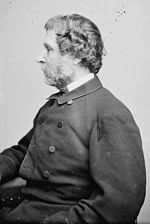How to Pronounce John C. Frémont
#50
Most Popular
Boost
Jan 21, 1813 Savannah, Georgia, United States Died on 13 Jul 1890 (aged 77)
United States Army general and explorer
AquariusJohn C. Frémont, Date of Birth, Place of Birth, Family, Facts, Age, Net Worth, Biography and More in FamedBorn.com

United States Army general and explorer
Aquarius